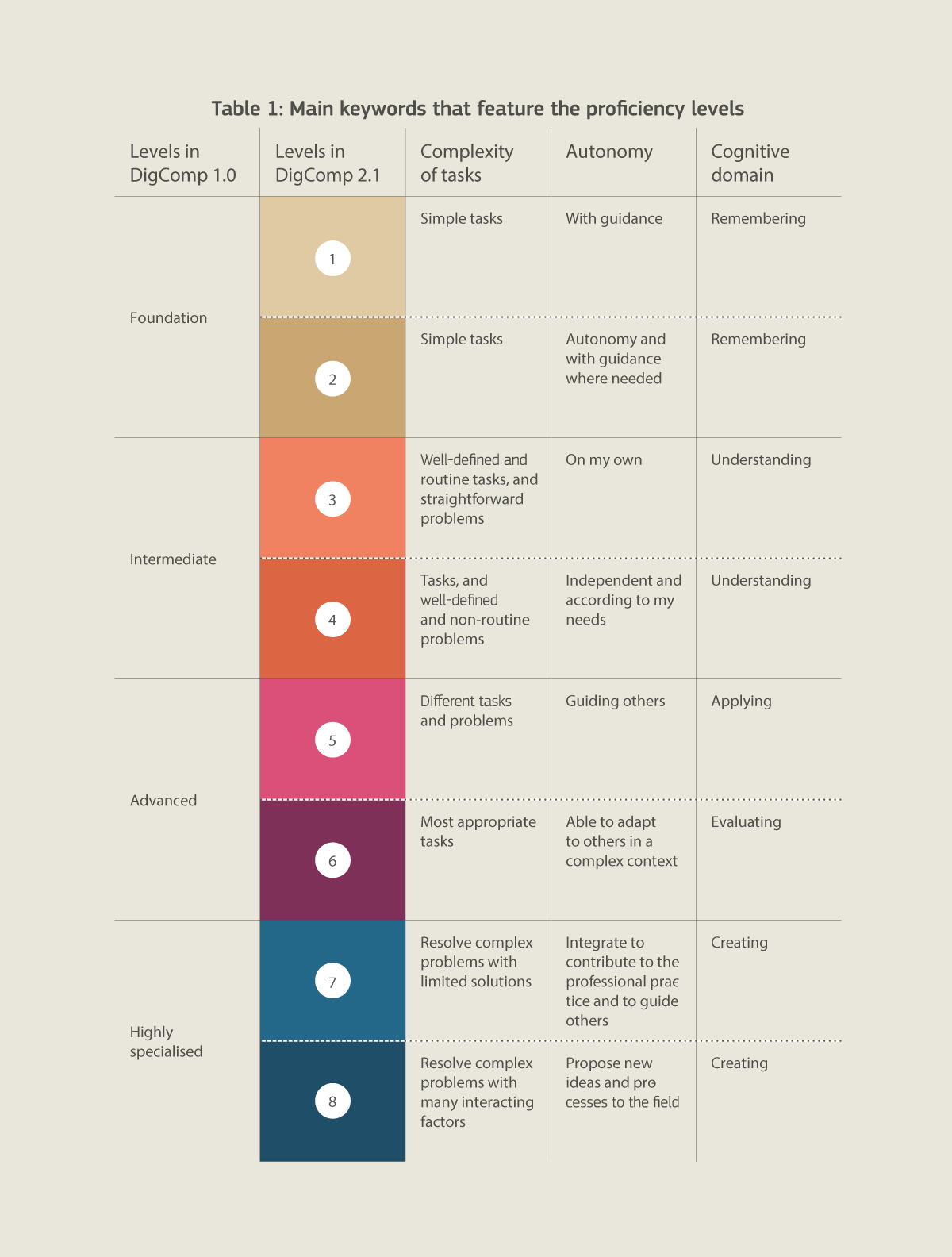Good computer skills? That is part of it. But above all, digital competence has become a complex cultural skill, the acquisition of which is strongly recommended. Anyone who wants to be active professionally and securely in the digital ocean of the 21st century would be well advised to start swimming their digital laps on a regular basis now – to train the different competence areas.
The competence package for the 21st-century working world is ready. It covers five different areas:
- Information and data competence, as well as data processing
- Communication and teamwork (cooperation)
- The creation of digital content
- Security
- Technical problem solving
The package has been put together by the EU Commission as part of the DigComp 2.1 framework concept, which we have already presented
Digital competence – a broad foundation for the future
‘PC skills desired’ was a phrase you would see in job vacancies not all too long ago, with the meaning being that you know how to use a computer well. The current concept, with the five core areas of digital competence listed above, goes far beyond computing or PC skills. Each of the five competence areas includes four more proficiency levels, each with two specifications (see image below) – from Foundation (level 1 and 2) via the Intermediate levels (3 and 4) to the Advanced (5 and 6) and Highly specialised (7 and 8) levels.
Digitisation: start with simple tasks – and improve
It is something we are probably all familiar with: a new till system in retail, a new PC program for accounting, a new machine on the factory floor or a new database in sales. You or your employees might also be familiar with some of the simple tasks, commands and applications involved, while others initially seem like a closed book due to their complexity. And yet, as soon as the first training session on a new program or device gets underway and an expert passes on the new knowledge required, you understand how the new way of working is supposed to function. In the ideal scenario, employee training or introductions to new systems will also provide an opportunity for discussion.
Innovation: mentoring programmes with potential for the future
The learning process is sometimes supported by mentoring programmes, as is the case at the international holding company BENTELER, headquartered in Salzburg. The company, which has around 30,000 employees in approximately 40 countries, has special expertise in materials, production and technology for the automotive, steel/tube and distribution sectors. Interdisciplinary knowledge transfer is encouraged from the start, so that everyone in the company can develop a deeper understanding of its different departments. At BENTELER, this involves the successful ‘apprentice teaches apprentice’ concept, in which even young employees pass on their know-how. An evaluation has demonstrated that the process is working very well. This good idea is an example that shows how digital knowledge can be built up as a foundation (level 1 and 2) for further specialisations.
Industry 4.0 – learning on new levels and in new ways
An example of how improvements in digital competences in the area can be achieved is provided by Deutsche Telekom AG, which has around 226,000 employees, of whom more than half are employed outside Germany. Different generations also work side by side within the company: both entrants, who as digital natives mostly have a solid foundation of digital competence, and employees who have been at the company for a long time, have completed vocational training, an apprenticeship or a degree and have received different levels of further training since. As IT security and experts in the subject are increasingly in demand, Telekom has introduced an ‘educational chain’ of different training programmes, with the aim of training highly specialised cyber-security professionals. The educational chain involves various apprenticeship, training and study programmes, as well as workshops, practical exercises and projects. Employees took part in internal training to expand their digital competences for an average of 3.6 days of the year (figures from 2015), with around 32,000 seminars taking place. An inspiration that illustrates how increased acquisition of competences can be organised within companies (levels 3 and 4).
Digital competence – a set of keys to the future
When you take a look at the five competence areas and the different DigComp 2.1 proficiency levels from Foundation to Highly specialised, as well as the accompanying main keywords, it soon becomes clear: PC skills are yesterday’s news – digitisation is raising the bar for each individual and every company to a new level. The tasks and problems to be handled in future will be increasingly complex. At the same time, acquiring digital competence is about understanding, step by step, what is going on in society and the world of work right now due to digitisation – at a regional, national and international level.
Digital competence – improve step by step part III
The world of work in the future will require specialised and highly specialised employees and managers who take initiative and contribute actively and creatively to shaping the digital work processes of tomorrow – with ideas and problem-solving approaches for a world that is becoming increasingly complex. There will be more on that subject in part III of the blog.





